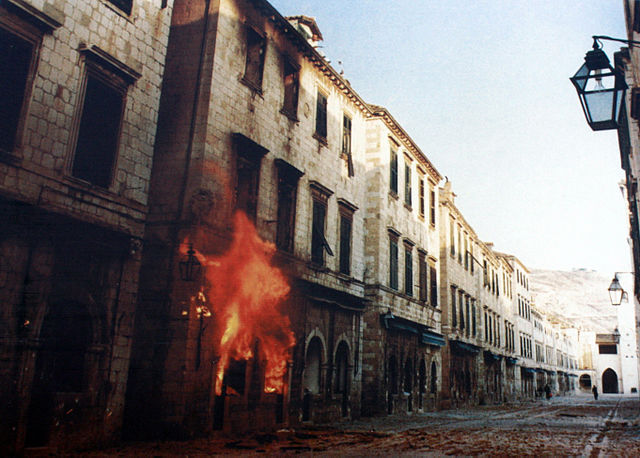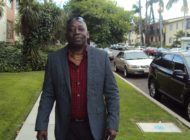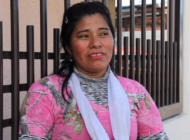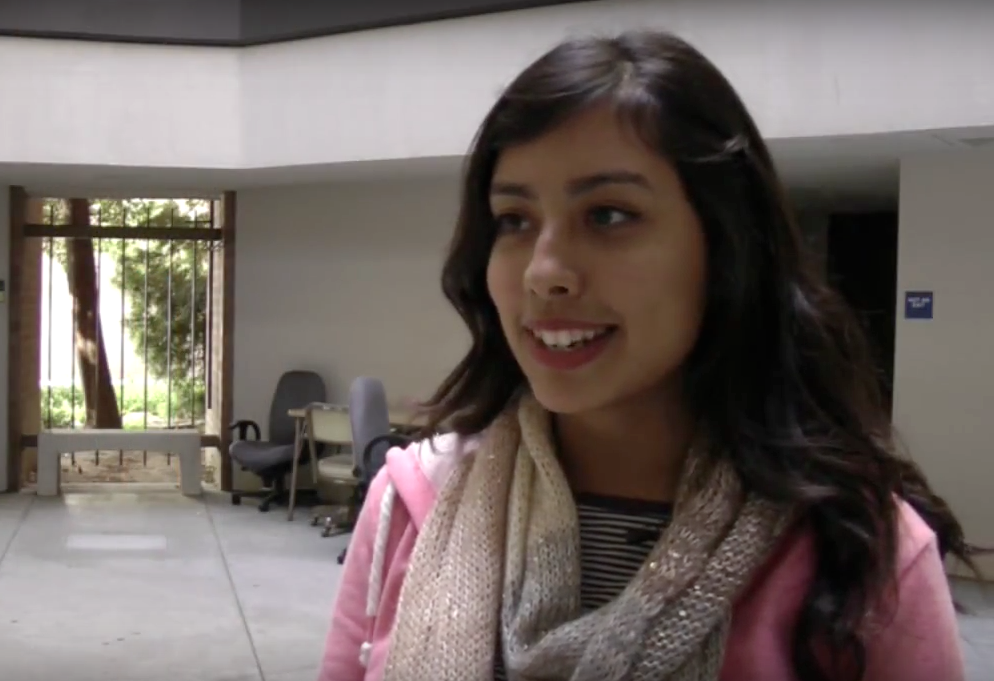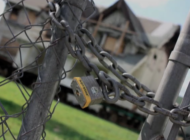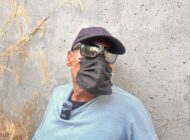The story of a Croatian refugee fleeing war to Austria and to the United States.
By EVERARDO TAMAYO
EL NUEVO SOL
The young man wearing skinny black Levi’s, white Converse shoes and holding his medium iced-mocha coffee drink with one hand while messaging his friends with the other, looked like a regular guy. There seemed nothing special about him, but appearances can be very deceiving.
“I’m excited about the party later today – which filter should I use for this selfie?” he asked.
“Which ever one you want but choose one that will capture the mood better,” his friend Dan Hill replied.
Few people know what lies beneath this causal and well-crafted façade, but I do. Luka Pavić, 29, was born in Dubrovnik in communist Yugoslavia. Luka Pavić is a tall, slim and toned man. He has dark hair and bright light-brown eyes that capture bystanders’ attention right away.
“Dubrovnik is a beautiful windswept town with high medieval walls surrounded by olive mountains and the azure Adriatic Sea. It is a very different place from this suburban strip mall in Ventura County,” Pavić said.
Yet, Pavić is no ordinary immigrant. He came to the United States as a young refugee.
From October 1st 1991 to 31st May 1992 Croatia was under siege by Yugoslav forces. Croatia was pursuing its independence from Yugoslavia which was engulfed in a violent war. The Croatian War of Independence took place from March 31st 1991 – November 12th 1995. The war was the result of political changes that occurred with the end of communist rule in Yugoslavia after which the different ethnic groups fought to create their own nations. During the war around 20,000 people lost their lives, while over 220,000 were displaced and forced to leave their homes. The age-old walls of Dubrovnik, in Croatia were attacked and fire rained on the people of the city.
Luka’s father, Tomislav Pavić, had volunteered to fight the Serbian forces in the mountains. Tomislav was gone a long time.
During this time, Luka age 5 and his mom, Svetlana, were huddled with Baba and Dedo, his paternal grandparents, in the basement of their century old home.
“It rained fire for days,” said Luka Pavić. “When we came out to get water at the well, all we saw was smoke coming from the city walls.”
Little Luka and his mother had to walk to the old wholesale market where international aid was distributed.
“The food was terrible” Pavić remembered. “It consisted mainly of old army rations” Pavić said.
At the market his mother gossiped with neighbors and colleagues about the progress of the war, he said.
“I remember seeing many women anxiously discussing how their men were struggling in the mountains. People were very afraid,” Pavić said.
The Siege of Dubrovnik conducted by the Yugoslav National Army against the newly independent Croat forces lasted from October 1st 1991 – May 31st 1992. During this period the city was shelled with heavy artillery and movement into and out of the city was nearly impossible, Slavko Vrdoljak, a retired History professor at the University in Zagreb said via telephone interview. However, the city and its defenders held out and after the devastation the citizens were left to rebuild the city. Many of the defenders died.
Luka Pavić’s father, Tomislav was luckier. He escaped from battle with a bad back and broken leg, and he still walks with a limp today.
![Map in Dubrovnik that shows the extent of war damage in the Old Town. The triangles represent direct impacts while the red shadings represent fires. Joy [Public domain], via Wikimedia Commons](https://elnuevosol.net/wp-content/uploads/2015/12/434px-Dubrovnik_shelling-326x450.jpg)
Map in Dubrovnik that shows the extent of war damage in the Old Town. The triangles represent direct impacts while the red shadings represent fires. Joy [Public domain], via Wikimedia Commons
Pavić and his family managed to flee to Vienna, Austria, where they had family friends. He remembers the fear he felt in the city with its large Serb population.
“I was afraid of speaking Croatian in public because of the many Serbs in the city. I didn’t want to get into a fight,” Pavić said.
His three year older sister Sonja Pavić was the one who took care of him when he was younger, while his mom and dad went to work.
“It was very hard for me to take care of him because I was a child too,” his sister Sonja said. “But I knew I had to do it to help out our family and we are where we are today because we are so strong.”
Today she says her favorite memory about Luka was when he would call her mama because she was the one who would take care of him most of the time, while their mother was cleaning hotels.
“He called me like that for a while, but I really liked it,” she said. “It made me feel like I had done something very special for him and meaningful.”
Luka remembers his mom always being worried about not having enough money and his father struggling to keep a decent job due to his injuries. His father also suffered from post-traumatic stress disorder, which made working even more difficult. The family struggled to make ends meet, while sending remittances back to Dubrovnik to support their relatives that had stayed behind.
Life was hard in Austria. Even though rent was cheap in Vienna because of extensive government subsidies and support, the family still struggled to integrate with the locals because they continued to feel like outsiders who do not belong, Luka Pavić said. The family missed their vibrant social life that they had before the war.
“I remember I always wanted toys and candy but my mom would only buy me one piece of candy and if I wanted another one she would say no because I already had one and that we could not afford to buy more than one,” Pavić said.
“I remember being ashamed of walking in school with my old passed-down clothes and shoes,” Pavić said, “while the Austrian kids had brand new Nikes that I could only dream of having.”
He remembers hearing his parents talking about leaving Vienna to go to the United States, but not understanding what the U.S was. He remembers many arguments and conversations about the difficulty of going there and the distance from their homeland Croatia.
“All I heard was, ‘Amerika, Amerika.’ That it was the land of dreams and how great it was there,” he said. “My parents would say they would start over and that everything was going to be great for us. We would have a much better life and pursue the American Dream. I guess they hoped for us to forget everything since we were so young but we didn’t.”
Although Luka Pavić does not think he would ever return to Vienna he says he is glad he lived there, because he appreciates learning about its historical and cultural heritage and learning how to speak and write in German.
After the stay in Vienna, in 1995 he and his family left for the United States or “Amerika” as he still calls it.
“America is the land of dreams here I can pursue my happiness,” Pavić said as we had a nicely chilled light beer at his friend Dan’s birthday party.
Luka Pavić seems happy out with his friends having fun, trying to forget or at least not remember all the memories about the war.
Nevertheless, deep inside he still caries these memories wherever he goes. He is still very connected to the country where he was born and despite not having been in Croatia for many years it is still in his heart and his family remains committed to Croatia.
“I remember when I first came to the U.S. I was confused. I remember thinking why are the streets so huge and how does everyone have their own house and car,” Pavić said as we drank our beer. “In Yugoslavia cars and houses were only for the political elite, but here they are for everyone.”
In America everything changed. Luka’s father was able to find a job and take up counseling that has helped him with his wartime trauma. The job was stable and gave a good paycheck. Luka remembers how his father told him, “Now you can have as many candies as you want every day.”
“One day my father took me to a giant warehouse, Walmart, inside I saw more clothes, food and things then I ever had before!” Luka said. “He took me to the sports section and bought me brand new Nike sneakers I was so happy I felt like I was in paradise.”
Luka Pavić has endured so much and he has not let his past bring him down. His traumatic last has not prevented him from creating a “new good life,” as he calls it, in the U.S. Like many other refugees in the country his past struggles will forever follow him, but it is because of everything he has been through that he is the man he is today.
“I’m proud of who I am today and I’m not ashamed of anything,” he said. “But I know that what I’ve been through has shaped me and it has been difficult but despite everything I am a very happy person. I thank God every day for bringing me to the United States. I have so many more opportunities here than I ever would have had in Croatia.”
Tags: Croatia Everardo Tamayo Luka Pavić refugee






